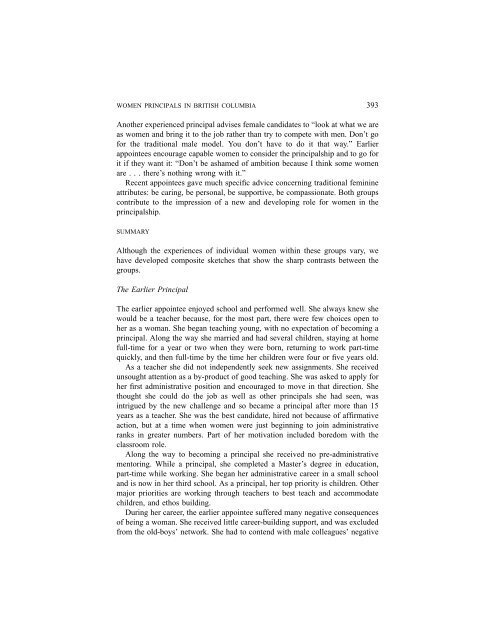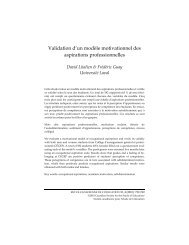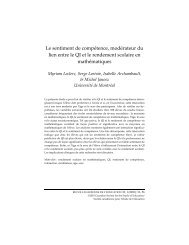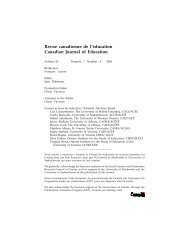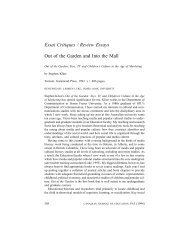Mireille Falardeau et Michel Loranger Le choix de stratégies ... - CSSE
Mireille Falardeau et Michel Loranger Le choix de stratégies ... - CSSE
Mireille Falardeau et Michel Loranger Le choix de stratégies ... - CSSE
Create successful ePaper yourself
Turn your PDF publications into a flip-book with our unique Google optimized e-Paper software.
WOMEN PRINCIPALS IN BRITISH COLUMBIA 393<br />
Another experienced principal advises female candidates to “look at what we are<br />
as women and bring it to the job rather than try to comp<strong>et</strong>e with men. Don’t go<br />
for the traditional male mo<strong>de</strong>l. You don’t have to do it that way.” Earlier<br />
appointees encourage capable women to consi<strong>de</strong>r the principalship and to go for<br />
it if they want it: “Don’t be ashamed of ambition because I think some women<br />
are...there’s nothing wrong with it.”<br />
Recent appointees gave much specific advice concerning traditional feminine<br />
attributes: be caring, be personal, be supportive, be compassionate. Both groups<br />
contribute to the impression of a new and <strong>de</strong>veloping role for women in the<br />
principalship.<br />
SUMMARY<br />
Although the experiences of individual women within these groups vary, we<br />
have <strong>de</strong>veloped composite sk<strong>et</strong>ches that show the sharp contrasts b<strong>et</strong>ween the<br />
groups.<br />
The Earlier Principal<br />
The earlier appointee enjoyed school and performed well. She always knew she<br />
would be a teacher because, for the most part, there were few choices open to<br />
her as a woman. She began teaching young, with no expectation of becoming a<br />
principal. Along the way she married and had several children, staying at home<br />
full-time for a year or two when they were born, r<strong>et</strong>urning to work part-time<br />
quickly, and then full-time by the time her children were four or five years old.<br />
As a teacher she did not in<strong>de</strong>pen<strong>de</strong>ntly seek new assignments. She received<br />
unsought attention as a by-product of good teaching. She was asked to apply for<br />
her first administrative position and encouraged to move in that direction. She<br />
thought she could do the job as well as other principals she had seen, was<br />
intrigued by the new challenge and so became a principal after more than 15<br />
years as a teacher. She was the best candidate, hired not because of affirmative<br />
action, but at a time when women were just beginning to join administrative<br />
ranks in greater numbers. Part of her motivation inclu<strong>de</strong>d boredom with the<br />
classroom role.<br />
Along the way to becoming a principal she received no pre-administrative<br />
mentoring. While a principal, she compl<strong>et</strong>ed a Master’s <strong>de</strong>gree in education,<br />
part-time while working. She began her administrative career in a small school<br />
and is now in her third school. As a principal, her top priority is children. Other<br />
major priorities are working through teachers to best teach and accommodate<br />
children, and <strong>et</strong>hos building.<br />
During her career, the earlier appointee suffered many negative consequences<br />
of being a woman. She received little career-building support, and was exclu<strong>de</strong>d<br />
from the old-boys’ n<strong>et</strong>work. She had to contend with male colleagues’ negative


